- Home
- Technical Cooperation Projects
- Index of Countries
- Middle East
- Egypt
- Project for Strengthening Water Management Transfer
- Project News
- Training Course on "Participatory Water Management in Japan" was implemented for Decision Makers of Ministry of Water Resources and Irrigation.
Project News
2013-10-09
Training Course on "Participatory Water Management in Japan" was implemented for Decision Makers of Ministry of Water Resources and Irrigation.
Project for Strengthening Water Management Transfer (SWMT Project) implemented a Training Course on "Participatory Water Management in Japan" for decision makers of Ministry of Water Resources and Irrigation (MWRI) of Egypt from September 15 to 25, 2013. Purposes of this training course were to give them a chance to deepen their recognitions on due roles and responsibilities of every counterpart in the SWMT Project by directly seeing and learning about organizational operations by Land Improvement Districts (LID) which are Water Users' Organizations (WUOs) in Japan as well as activities of the other related Japanese organizations. Eng. Mohamed Abdel Khaleq Beltagi, Head of Irrigation Department of MWRI, Eng. Nagwa El Khashab, Head of the Central Department of Irrigation Advisory Service (CDIAS) of the MWRI, and three Undersecretaries of Irrigation whose governorates are in charge of the pilot sites, participated in the training course and visited two LIDs of Toyo River and Ryosou as well as the related organizations including JICA and Ministry of Agriculture, Forestry and Fisheries (MAFF) of Japan with Eng. Kunihiko Naito, Chief Advisor of the SWMT Project to learn not only about Japanese land improvement projects, but also about operation and management (O&M) of water facilities.
At Department of Toyokawa River System of Japan Water Agency, the trainees had lectures about construction, administrative workflow and roles and responsibilities for O&M of the water facilities. It should be noted that thanks to Dr. Masayoshi Satoh, Professor Emeritus of University of Tsukuba who accompanied the trainees to visit the Toyokawa River System, they could fully understand the system there. After visiting those water facilities, they were given lectures on organization and roles of the LIDs by the LID of Toyokawa River and looked impressed by the fact that various decisions and coordination are made by village people.
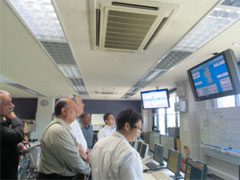 Central control system, Toyokawa River System
Central control system, Toyokawa River System
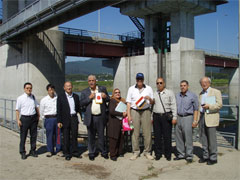 Muromatsubara Weir, Toyo River System
Muromatsubara Weir, Toyo River System
Thereafter, they moved to Tokyo and had lectures about "Agricultural and Rural Development in Japan" and "Irrigation Management of Japan" at MAFF soon after their courtesy visits at JICA and the Rural Development Bureau of MAFF. In the lecture on Irrigation Management of Japan by Dr. Satoh, the trainees could get many hints to plan water management transfer in Egypt since Dr. Satoh fully explained them about history and experiences of Japanese Land Improvement System.
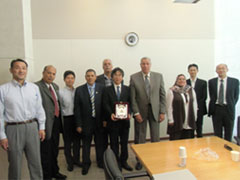 Courtesy visit to JICA
Courtesy visit to JICA
At the LID of Ryoso in Chiba Prefecture, the trainees visited major water facilities after having lectures on activities, organization and roles of the LID. They looked very impressed to see the LID actively participating in water management. On the weekend, they visited Oyama Senmaida (Rice terraces) in Kamogawa-city of Chiba Prefecture, Naramata Dam and Takumi's Village in Minakami-town of Gumma Prefecture. In Oyama Senmaida which has been facing local issues on decrease of the population with high rate of the old population, many local activities including a system of "Rice terrace's owner" and an exchange event with university students in urban areas which aim at enhancing interaction with urban areas, were introduced to the trainees by NPO to preserve the Oyama Senmaida. At Naramata Dam, they could learn and well understand importance of regulating floods in management of Japanese rivers.
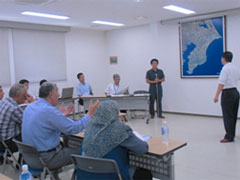 Lecture in the LID of Ryoso
Lecture in the LID of Ryoso
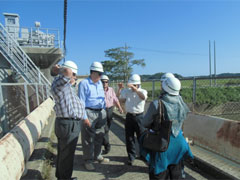 Sasamoto Weir in Ryoso
Sasamoto Weir in Ryoso
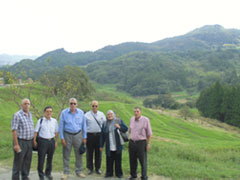 Oyama Senmaida
Oyama Senmaida
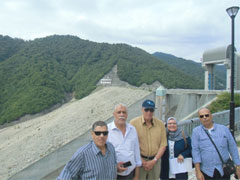 Naramata Dam
Naramata Dam
On the final day, the trainees visited Japan Association of Rural Solutions for Environmental Conservation and Resource Recycling (JARUS) to have a lecture about rural sewer system. They looked very interested in the lecture and asked to the trainer many technical questions related to the maintenance cost and the criteria for treated water since Egypt has been facing a challenging problem on quality of agricultural water. After the lecture, they were finally given the certificate to complete the training course and it was successfully ended.
During the training course, the trainees were actively participating in all the programs with their high interests in spite of the tight schedule all the time. Since they were much satisfied with the whole training course, we believe that through the training course, they could enough recognize their own issues to solve for implementation of water management transfer in Egypt. Finally we cordially thank all for their kind support to the training course.
- About JICA
- News & Features
- Countries & Regions
- Our Work
- Thematic Issues
- Types of Assistance
- Partnerships with Other Development Partners
- Climate Change / Environmental and Social Considerations
- Evaluations
- Compliance and Anti-corruption
- Science and Technology Cooperation on Global Issues
- Research
- JICA Development Studies Program / JICA Chair
- Support for the Acceptance of Foreign HRs / Multicultural and Inclusive Community
- Publications
- Investor Relations
